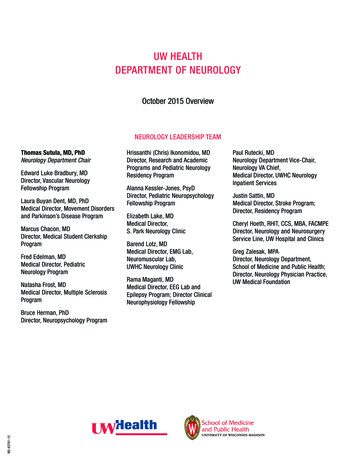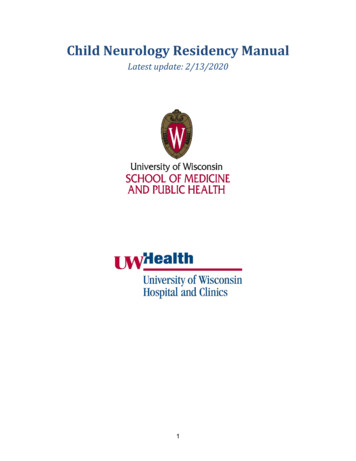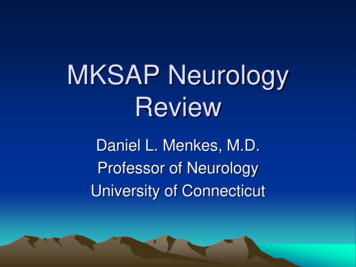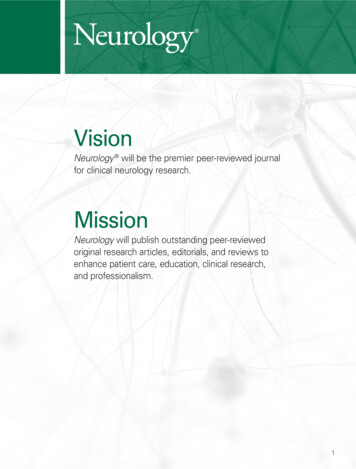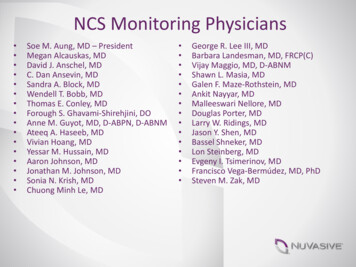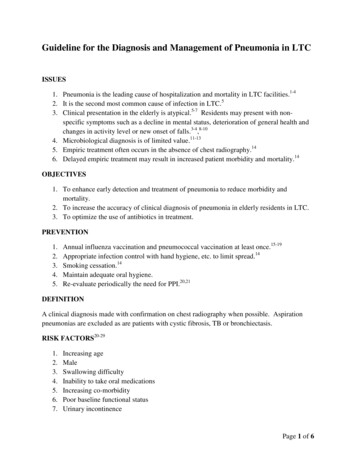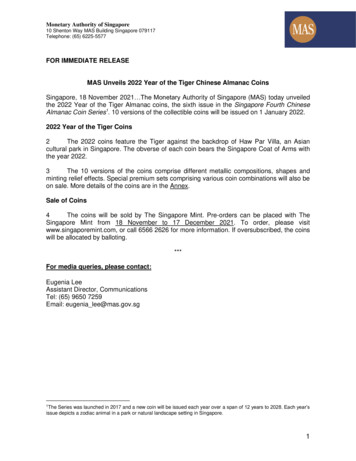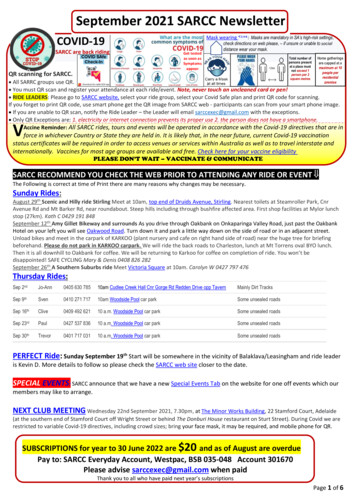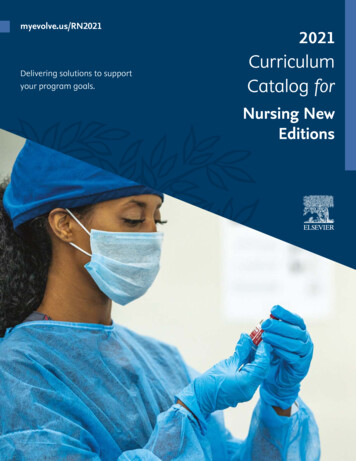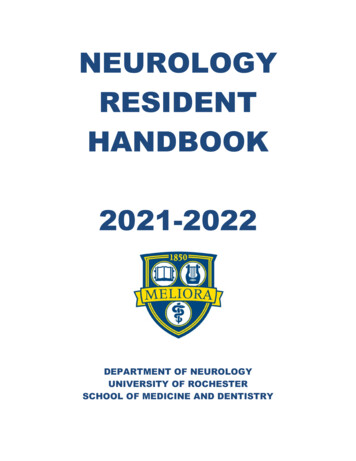
Transcription
NEUROLOGYRESIDENTHANDBOOK2021-2022DEPARTMENT OF NEUROLOGYUNIVERSITY OF ROCHESTERSCHOOL OF MEDICINE AND DENTISTRY
NEUROLOGYRESIDENTHANDBOOK2021-2022DEPARTMENT OF NEUROLOGYUNIVERSITY OF ROCHESTERSCHOOL OF MEDICINE AND DENTISTRYCopyright 2021, by Department of Neurology, University of Rochester
FOREWORDThis Neurology Resident Handbook is intended as a handy reference for all Neurologyclinical faculty, residents and administrative staff. The handbook is divided into sevensections as follows: ACGME New Accreditation System: This section contains specific program goalsand objectives for the neurology residency, the neurology core competencies thatare part of the ACGME New Accreditation System, the Neurology Milestones, anddescriptions of specific evaluation instruments used to evaluate neurology residentsat the University of Rochester. Research Initiatives and Conferences: This section includes information about theresident research experience and descriptions of several of the neurologyconference series. Inpatient Rotation Guidelines: This section contains guidelines for the neurologyresidents for all of the core inpatient rotations. Elective Guidelines: This section contains guidelines for the neurology residents fordepartmental and inter-departmental electives. Outpatient Rotation Guidelines: This section contains guidelines for the residentfirms and the Chief Resident Faculty Practice clinics. Policies: This section contains all of the specific policies that involve neurologyresidents, as mandated by the ACGME. Bibliography: This section contains a bibliography for adult neurology and should beused as a guide to reading for neurology residents. Schedules: The final section of this handbook contains all of the rotation and clinicschedules for neurology residents and faculty for the current academic year.The Residency Review Committee for Neurology mandates that we collate all of thisinformation and distribute it annually to all clinical faculty and residents in ourdepartment. All neurology faculty and residents should be familiar with the goals andobjectives, rotation guidelines and policies included in this handbook. A thoroughunderstanding of these goals, guidelines and policies will help insure that our residencyprogram runs smoothly and meets its mission of excellence in patient care, educationand research.Ralph F. Józefowicz, MDResidency Program DirectorDepartment of NeurologyJuly 1, 2021
TABLE OF CONTENTSPart 1 – ACGME Core Competency Project1.Program Goals2.ACGME New Accreditation System3.Neurology Core Competencies4.The ACGME Milestones Project5.Neurology Milestones6.Resident Evaluation Instruments7.Residency In-service Training Examination8.Clinical Skills Evaluation9.ABPN Clinical Skills Evaluation of Residents10.Medical Student Assessment11.Attending Global Assessment12.Chart Review13.Neurology Resident Chart Review Form14.Resident Case Log15.360 Evaluation16.360 Assessment Form17.Resident Portfolio18.ACGME Core Competency Project Summary TablesPage178171947495152535455565758596161Part 2 – Research Initiatives and Conferences19.Resident Mentoring Program20.Resident Research Experience21.Resident and Fellow Research Symposium22.Resident Journal Club23.History of Neurology Conference Series6568697070Part 3 – Inpatient Rotation Guidelines24.General Guidelines for the Activity of the Neurology Resident at SMH25.Neurology Conference Schedule26.Inpatient Attending Physician’s Responsibilities27.Highland Hospital Residency Rotation28.Child Neurology Resident Rotation29.Psychiatry Rotation30.Neuromedicine ICU Rotation31.Integrated Neuromuscular Disease – EMG Rotation32.Clinical Neurophysiology and Epilepsy Rotations718385899399103115121Part 4 – Outpatient Rotation Guidelines33.Guidelines for the Resident Firms34.Chief Resident Faculty Practice Clinics131137Part 5 – Elective Guidelines35.Headache Elective36.Memory Care Program Elective37.Movement Disorders Elective38.Neuro-oncology Elective39.Neuro-ophthalmology Elective40.Neuropathology Elective41.Neuroradiology Elective42.Pain Management Elective43.Palliative Care Elective44.Sleep Medicine Elective139141145153157161163167171177
Part 6 – Policies45.Policy on Selection of Residents46.Policy on Resident Supervision47.Policy on Progressive Responsibility for Patient Management48.Policy on Hand-offs49.Policy on Resident Work Hours50.Policy on Evaluation and Promotion of Residents51.Policy on Evaluation of Faculty and of the Residency Program52.Policy on Moonlighting53.Policy on Resident Professional Expenses54.Program Evaluation Committee55.Clinical Competency Committee181182184185189190192193194195195Part 7 – Bibliography56.Bibliography for Adult Neurology197Part 8 – Schedules57.Department of Neurology Clinical Faculty58.Adult Neurology Resident Block Schedules59.Child Neurology Resident Schedules60.Neurology Resident Vacation Schedules61.Adult Neurology Resident Firm Assignments62.Neurology Ambulatory Block Rotation Schedules63.Adult Neurology Attending Schedule64.Child Neurology Attending Schedule65.Child Neurology Weekend Coverage66.Important Dates for 2018-201967.Chief Resident Responsibilities68.Neurology Resident Committee Assignments203204210212216217226228229230230230
GOALS OF THE NEUROLOGYRESIDENCY TRAINING PROGRAMOverall Competency-Based Program GoalsPatient CareResidents must be able to provide patient care that is compassionate, appropriate, andeffective for the treatment of health problems and the promotion of health.Residents must demonstrate competency in the management of outpatients andinpatients with neurological disorders across the lifespan, including those who requireemergency and intensive care.Medical KnowledgeResidents must demonstrate knowledge of established and evolving biomedical, clinical,epidemiological and social-behavioral sciences, as well as the application of thisknowledge to patient care.Residents must demonstrate understanding about major developments in the clinicalsciences relating to neurology, and must demonstrate understanding of the basicsciences through application of this knowledge in the care of their patients and bypassing clinical skills examinations.Practice-based Learning and ImprovementResidents must demonstrate the ability to investigate and evaluate their care of patients,to appraise and assimilate scientific evidence, and to continuously improve patient carebased on constant self-evaluation and life-long learning. Residents are expected todevelop skills and habits to be able to meet the following goals:1.Identify strengths, deficiencies, and limits in one’s knowledge and expertise2.Set learning and improvement goals3.Identify and perform appropriate learning activities4.Systematically analyze practice using quality improvement methods, and implementchanges with the goal of practice improvement5.Incorporate formative evaluation feedback into daily practice6.Locate, appraise, and assimilate evidence from scientific studies related to theirpatients’ health problems7.Use information technology to optimize learning8.Participate in the education of patients, families, students, residents and other healthprofessionals9.Supervise other residents, medical students, nurses, and other health care personnel1
Interpersonal and Communication SkillsResidents must demonstrate interpersonal and communication skills that result in theeffective exchange of information and collaboration with patients, their families, andhealth professionals. Residents are expected to:1.Communicate effectively with patients, families, and the public, as appropriate, across abroad range of socioeconomic and cultural backgrounds2.Communicate effectively with physicians, other health professionals, and health relatedagencies3.Work effectively as a member or leader of a health care team or other professionalgroup4.Act in a consultative role to other physicians and health professionals5.Maintain comprehensive, timely, and legible medical recordsProfessionalismResidents must demonstrate a commitment to carrying out professional responsibilitiesand an adherence to ethical principles. Residents are expected to demonstrate:1.Compassion, integrity, and respect for others2.Responsiveness to patient needs that supersedes self-interest3.Respect for patient privacy and autonomy4.Accountability to patients, society and the profession5.Sensitivity and responsiveness to a diverse patient population, including but not limitedto diversity in gender, age, culture, race, religion, disabilities, and sexual orientationSystems-based PracticeResidents must demonstrate an awareness of and responsiveness to the larger contextand system of health care, as well as the ability to call effectively on other resources inthe system to provide optimal health care. Residents are expected to:1.Work effectively in various health care delivery settings and systems relevant to theirclinical specialty2.Coordinate patient care within the health care system relevant to their clinical specialty3.Incorporate considerations of cost awareness and risk-benefit analysis in patient and/orpopulation-based care as appropriate4.Advocate for quality patient care and optimal patient care systems5.Work in inter-professional teams to enhance patient safety and improve patient carequality6.Participate in identifying system errors and implementing potential systems solutions2
Overall Program Goals1. To prepare the physician for the independent practice of clinical neurology by providingtraining based on supervised clinical work with increasing responsibility for outpatientsand inpatients. PC2. To provide a foundation of organized instruction in the basic neurosciences. MK3. To provide an opportunity to develop and maintain an investigative career in the basicneurosciences and in clinical neurology. MK4. To acquire an appreciation for the history of neurology and the rich traditions of ourspecialty. SBP5. To acquire the many personal attributes necessary for becoming an effective physician,including honesty, compassion, reliability, and effective communication skills. P, ICSGoals for the First Year1. To elicit an accurate neurologic history and to perform and interpret a neurologicalexamination on patients presenting with neurological symptoms. PC2. To appropriately order laboratory studies in neurology: EEG, EMG, nerve conductionstudies, evoked potentials, lumbar puncture, CT and MR imaging of the brain and spinalcord. PC3. To appropriately evaluate and treat common neurological problems: Neurological Emergencies: Coma and mental status changes, stroke, seizures. MK,PC Common outpatient neurological problems: Headache, dizziness, back and neckpain, peripheral neuropathies. MK, PC4. To demonstrate effective written and oral communication skills. ICSGoals for the Second Year1. To perfect the resident’s history-taking skills and neurologic exam in infants and children.PC2. To diagnose, evaluate and treat multiple sclerosis, Parkinson's disease and othermovement disorders, neuromuscular diseases, dementia, central nervous systeminfections, and tumors of the nervous system. PC, MK3. To interrelate abnormalities of the nervous system with normal growth and developmentof the nervous system. PC4. To provide the resident with an exposure to and a forum for discussion of a wide varietyof neurologic problems in adults and pediatric patients. PBLI3
Goals for the Third Year1. To independently evaluate and manage patients presenting with a wide variety ofinpatient and outpatient neurological disorders. PC2. To perform and interpret EMG’s, Nerve Conduction Studies, EEG’s and evoked potentialtesting. PC, MK3. To supervise junior residents on the inpatient neurology services at Strong MemorialHospital. PBLI, SBP4. To participate as a laboratory instructor in the Medical Student Nervous System Course.PBLIGoals for the SMH General Neurology Rotation1. To develop skills in obtaining complete neurological histories, in performing accurateneurological examinations, and in selecting appropriate therapies on a generalneurology consultation service in a tertiary referral center. PC2. To acquire in-depth knowledge of major categories of neurological disease, with specialemphasis on epilepsy, coma and mental status changes, movement disorders,neuromuscular disorders, demyelinating disorders, infections of the nervous system,tumors of the nervous system, head trauma and dementia. MK3. To gain experience in the appropriate ordering and interpretation of neurodiagnostictests, including head and spine CT and MR scans, EEG, Evoked Potential Testing,Neurovascular testing, and EMG and nerve conduction studies. PC, SBP4. To develop and improve written and oral communication skills. ICSGoals for the SMH Stroke Rotation1. To recognize the signs and symptoms of acute ischemic stroke. PC2. To utilize current treatment guidelines for ischemic stroke, especially concerning bloodpressure management, anticoagulation, and use of thrombolytic therapy. MK3. To identify common risk factors for stroke. MK4. To utilize current recommendations for the use of anti-platelet agents and oral anticoagulants in stroke prevention. MK5. To utilize strategies for preventing and treating increased intracranial pressure. MK6. To perform and record the National Institutes of Health Stroke Scale. PC, SBP4
Goals for the SMH Chief Resident Rotation1. To become independent in the evaluation and management of patients presenting with awide variety of inpatient and outpatient neurological disorders. PC2. To gain experience supervising junior residents on the inpatient neurology services atStrong Memorial Hospital. PBLI, SBP3. To develop administrative skills with respect to organizing and scheduling teachingconferences for the department of neurology. SBPKey to Core Competencies:PKMKPBLIICSPSBPPatient careMedical knowledgePractice-based learning and improvementInterpersonal and communication skillsProfessionalismSystems-based practiceGoals for other rotations and electives are included with the specific rotation guidelinesbelow.5
6
ACGME NEW ACCREDITATION SYSTEMAt its February 1999 meeting, the ACGME endorsed general competencies for residentsin the areas of Patient careMedical knowledgePractice-based learning and improvementInterpersonal and communication skillsProfessionalismSystems-based practiceIdentification of general competencies is the first step in a long-term effort designed toemphasize educational outcome assessment in residency programs and in theaccreditation process. As of July 2002, the ACGME’s Residency Review andInstitutional Review Committees have incorporated the general competencies into theirRequirements. The following Neurology Core Competencies were developed by theAmerican Board of Psychiatry and Neurology, and represent what each graduate of theadult neurology residency training program at the University of Rochester is expected tolearn by the end of his/her residency. All evaluation instruments are keyed to these sixcore competencies.In 2013, the ACGME adopted the New Accreditation System (NAS), effectively replacingthe previous system of five-year site visits to residency programs that was focused onprocess and not outcomes. A key feature of the NAS will be the Milestones, which are aset of competency-based developmental outcomes (e.g., knowledge, skills, attitudes,and performance) that can be demonstrated progressively by residents and fellows fromthe beginning of their education through graduation to the unsupervised practice of theirspecialties. Milestones were developed for each specialty by committees consisting ofrepresentatives from the Specialty Boards, Residency Review Committees, ProgramDirector Associations, and Resident and Fellow representatives. Residency programswill now undergo 10-year self-study visits that replace the traditional five-year site visits.In addition, each hospital that sponsors residency programs will undergo a ClinicalLearning Environment Review (CLER) visit every 18 months, which will focus on patientsafety, quality improvement, and resident work hours.7
AMERICAN BOARD OF PSYCHIATRY & NEUROLOGYNEUROLOGY CORE COMPETENCIESI.Patient Care and Procedural SkillsA. Neurologists shall demonstrate the following abilities:1. To perform and document a relevant history and examination on culturallydiverse patients to include as appropriate:a. Chief complaintb. History of present illnessc. Past medical historyd. A comprehensive review of systemse. A family historyf.A sociocultural historyg. A developmental history (especially for children)h. A situationally germane general and neurologic examination2. To delineate appropriate differential diagnoses3. To evaluate, assess, and recommend effective management of patientsB. Based on a comprehensive neurological assessment, neurologists shalldemonstrate the following abilities:1. To determine:a. If a patient's symptoms are the result of a disease affecting the centraland/or peripheral nervous system or are of another origin (e.g., of asystemic, psychiatric, or psychosomatic illness)b. A formulation, differential diagnosis, laboratory investigation, andmanagement plan2. To develop and maintain the technical skills to:a. Perform comprehensive neurological examinationb. Perform screening psychiatric examinationc. Perform lumbar puncture, edrophonium, and caloric testingd. Identify and describe abnormalities seen in common neurologicaldisorders on radiographic testing, including plain films, myelography,angiography, CT, isotope, and MRIe. Evaluate the application and relevance of investigative procedures andinterpretation in the diagnosis of neurological disease, including thefollowing:i.Electroencephalogramii. Motor and nerve conduction studiesiii. Electromyography8
iv. Evoked potentialsv. Polysomnographyvi. Autonomic function testingvii. Electronystagmogramviii. Audiometryix. Perimetryx. Psychometricsxi. CSF analysisxii. Imaging with ultrasound (Duplex, transcranial Doppler)xiii. Radiographic studies as outlined abovef.Identify and describe gross and microscope specimens taken from thenormal nervous system and from patients with major neurologic disordersII. Medical KnowledgeA. Neurologists shall demonstrate the following:1. Knowledge of major disorders, including considerations relating to age,gender, race, and ethnicity, based on the literature and standards of practice.This knowledge shall include:a. The epidemiology of the disorderb. The etiology of the disorder, including medical, genetic, and socioculturalfactorsc. The phenomenology of the disorderd. An understanding of the impact of physical illness on the patient’sfunctioninge. The experience, meaning, and explanation of the illness for the patientand family, including the influence of cultural factors and culture-boundsyndromesf.Effective treatment strategiesg. Course and prognosis2. Knowledge of healthcare delivery systems, including patient and familycounseling3. Systems-based Practice4. Knowledge of the application of ethical principles in delivering medical care5. Ability to reference and utilize electronic systems to access medical,scientific, and patient informationB. Neurologists shall demonstrate knowledge of the following:1. Basic neuroscience that is critical to the practice of neurology9
2. Pathophysiology and treatment of major psychiatric and neurologicaldisorders and familiarity with the scientific basis of neurology, including:a. Neuroanatomyb. Neuropathologyc. Neurochemistryd. Neurophysiologye. Neuropharmacologyf.Neuroimmunology/neurovirologyg. Neurogenetics/molecular neurology and neuroepidemiologyh. ogyk. Neuro-otologyl.Child neurologym. Geriatric neurologyn. Interventional neurology (basic principles only)3. Neurologic disorders and diseases across the lifespan, including treatmentfor the following:a. Dementia and behavioral neurology disordersb. Epilepsy and related disordersc. Neuromuscular disordersd. Demyelinating and dysmyelinating disorders of the central nervoussysteme. Cerebrovascular disordersf.Infectious diseases of the nervous systemg. Neoplastic disorders and tumors of the nervous systemh. Nervous system traumai.Toxic and metabolic disorders of the nervous systemj.Acute, chronic paink. Sleep disordersl.Changes in mental state second to therapym. Critical care and emergency neurologyn. Coma and brain deatho. Headache and facial painp. Movement disorders, including abnormalities caused by drugsq. End of life care and palliative care10
r.Neurologic disorders associated with vitamin deficiency or excess4. Patient evaluation and treatment selection, including:a. The nature of patients’ histories and physical findings and the ability tocorrelate the findings with a probable localization for neurologicdysfunctionb. Probable diagnoses and differential diagnosesi.In adultsii. In childrenc. Planning for evaluation and managementd. Potential risks and benefits of potential therapies, including surgicalprocedures5. Psychiatry, including:a. Psychopathology, epidemiology, diagnostic criteria, and clinical course forcommon psychiatric disorders, includingi.Disorders usually first diagnosed in infancy, childhood, oradolescenceii. Schizophrenic and other psychotic disordersiii. Mood disordersiv. Anxiety disordersv. Somatoform disordersvi. Factitious disordersvii. Dissociative disordersviii. Sexual and gender identity disordersix. Eating disordersx. Adjustment disordersxi. Delirium, dementia, amnestic, and other cognitive disordersxii. Mental disorders due to general medical conditionsxiii. Neurologic presentations following emotional, sexual, and/or physicalabusexiv. Substance-related disordersxv. Disorders of higher cortical functionb. Psychopharmacologyi. Major drugs used for treatment, e.g., antipsychotics,antidepressants, antianxiety agents, mood stabilizersii. Side effects of drugs used for treatment, e.g., acute, motor,neuroleptic malignant syndrome11
iii. Iatrogenic disorders in psychiatry and neurology, changes in mentalstatus, and movement disordersiv. Nonpharmacologic treatments and management6. Employment of principles of quality improvement in practiceIII. Interpersonal and Communications SkillsA. Neurologists shall demonstrate the following competencies:1. To listen to and understand patients and to attend to nonverbalcommunication2. To communicate effectively with patients using verbal, nonverbal, and writtenskills as appropriate3. To develop and maintain a therapeutic alliance with patients by instillingfeelings of trust, honesty, openness, rapport, and comfort in the relationshipwith physicians4. To partner with patients to develop an agreed upon healthcare managementplan5. To transmit information to patients in a clear and meaningful fashion6. To understand the impact of physicians’ own feelings and behavior so that itdoes not interfere with appropriate treatment7. To communicate effectively and work collaboratively with allied healthcareprofessionals and with other professionals involved in the lives of patientsand families8. To educate patients, their families, and professionals about medical,psychosocial, and behavioral issues9. To preserve patient confidentialityB. Neurologists shall demonstrate the ability to obtain, interpret, and evaluateconsultations from other medical specialties. This shall include:1. Knowing when to solicit consultation and having sensitivity to assess theneed for consultation2. Formulating and clearly communicating the consultation question3. Discussing the consultation findings with the consultant4. Discussing the consultation findings with the patient and familyC. Neurologists shall serve as an effective consultant to other medical specialists,and community agencies by demonstrating the abilities to:1. Communicate effectively with the requesting party to refine the consultationquestion2. Maintain the role of consultant3. Communicate clear and specific recommendations4. Respect the knowledge and expertise of the requesting professionals12
D. Neurologists shall demonstrate the ability to communicate effectively withpatients and their families by:1. Matching all communication to the educational and intellectual levels ofpatients and their families2. Demonstrating sociocultural sensitivity to patients and their families3. Providing explanations of psychiatric and neurological disorders andtreatment that are jargon-free and geared to the educational/intellectual levelsof patients and their families4. Providing preventive education that is understandable and practical5. Respecting patients' cultural, ethnic, religious, and economic backgrounds6. Developing and enhancing rapport and a working alliance with patients andtheir families7. Ensuring that the patient and/or family have understood the communication8. Responding promptly to electronic communications when used as acommunication method agreed upon by neurologists and their patients andpatients’ familiesE. Neurologists shall maintain up-to-date medical records and write legibleprescriptions. These records must capture essential information whilesimultaneously respecting patient privacy, and they must be useful to healthprofessionals outside neurology.F. Neurologists shall demonstrate the ability to effectively lead a multidisciplinarytreatment team, including being able to:1. Listen effectively2. Elicit needed information from team members3. Integrate information from different disciplines4. Manage conflict5. Clearly communicate an integrated treatment planG. Neurologists shall demonstrate the ability to communicate effectively withpatients and their families while respecting confidentiality. Such communicationmay include:1. The results of the assessment2. Use of informed consent when considering investigative procedures3. Genetic counseling, palliative care, and end-of-life issues when appropriate4. Consideration and compassion for the patient in providing accurate medicalinformation and prognosis5. The risks and benefits of the proposed treatment plan, including possibleside-effects of medications and/or complications of non-pharmacologictreatments6. Alternatives (if any) to the proposed treatment plan13
7. Appropriate education concerning the disorder, its prognosis, and preventionstrategiesIV. Practice-Based Learning and ImprovementA. Neurologists shall recognize limitations in their own knowledge base and clinicalskills, and understand and address the need for lifelong learning.B. Neurologists shall demonstrate appropriate skills for obtaining and evaluating upto-date information from scientific and practice literature and other sources toassist in the quality care of patients. This shall include, but not be limited to:1. Use of medical libraries2. Use of information technology, including Internet-based searches andliterature databases3. Use of drug information databases4. Active participation, as appropriate, in educational courses, conferences, andother organized educational activities both at the local and national levelsC. Neurologists shall evaluate caseload and practice experience in a systematicmanner. This may include:1. Case-based learning2. Use of best practices through practice guidelines or clinical pathways3. Review of patient records4. Obtaining evaluations from patients, e.g., outcomes and patient satisfaction5. Employment of principles of quality improvement in practice6. Obtaining appropriate supervision and consultation7. Maintaining a system for examining errors in practice and initiatingimprovements to eliminate or reduce errorsD. Neurologists shall demonstrate the ability to critically evaluate relevant medicalliterature. This may include:1. Using knowledge of common methodologies employed in neurologic research2. Researching and summarizing a particular problem that derives from theirown caseloadsE. Neurologists shall demonstrate the abilities to:1. Review and critically assess scientific literature to determine how quality ofcare can be improved in relation to one's practice, e.g., reliable and validassessment techniques, treatment approaches with establishedeffectiveness, practice parameter adherence. Within this aim, neurologistsshall be able to assess the generalizability or applicability of research findingsto one’s patients in relation to their sociodemographic and clinicalcharacteristics2. Develop and pursue effective remediation strategies that are based on criticalreview of the scientific literature14
V. ProfessionalismA. Neurologists shall demonstrate responsibility for their patients' care, including:1. Responding to communication from patients and health professionals in atimely manner2. Establishing and communicating back-up arrangements, including how toseek emergent and urgent care when necessary3. Using medical records for appropriate documentation of the course of illnessand its treatment4. Providing coverage if unavailable, e.g. when out of town or on vacation5. Coordinating care with other members of the medical and/or multidisciplinaryteam6. Providing for continuity of care, including appropriate consultation, transfer, orreferral if necessaryB. Neurologists shall demonstrate ethical behavior, integrity, honesty, compassion,and confidentiality in the delivery of care, including matters of informedconsent/assent, professional conduct, and conflict of interest.C. Neurologists shall demonstrate respect for patients and their families, and theircolleagues as persons, including their ages, cultures, disabilities, ethnicities,genders, socioeconomic backgrounds, religious beliefs, political leanings, andsexual orientations.D. Neurologists shall demonstrate understanding of and sensitivity to end of life careand issues regarding provision of care and clinical competence.E. Neurologists shall review their professional conduct and remediate whenappropriate.F. Neurologists shall participate in the review of the professional conduct of
Schedules: The final section of this handbook contains all of the rotation and clinic schedules for neurology residents and faculty for the current academic year. The Residency Review Committee for Neurology mandates that we collate all of this information and distribute it annually
